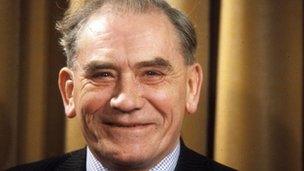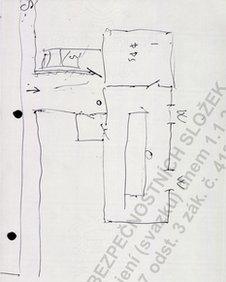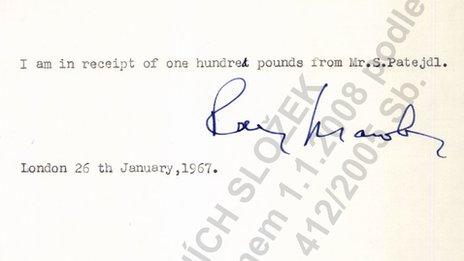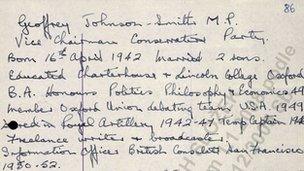Ray Mawby: Ministers to seek other side of story about 'spy'
- Published

Raymond Mawby was deselected as an MP in 1983 and died in 1990
The government is to see how the "other side of the story" can be put into the public domain about a former minister alleged to have spied for the Czechs.
Cabinet minister Sir George Young said only one side of the story about ex-Tory MP Ray Mawby had been put forward.
He said it was "imperative" the other side was "also put forward in the interests of friends and family".
Sarah Wollaston, MP for the same area Mr Mawby represented, had called for an inquiry into the allegations.
She said: "These very serious allegations, amounting to treason, need to be fully investigated, but also fairly investigated because Mr Mawby is not here to defend himself and it's in none of our interests to have trial by media."
Sir George, Leader of the Commons, responded that he had served in the Commons alongside Mr Mawby from 1974 until the former minister stepped down in 1983.
He added: "So far one side of the story has been put into the public domain.
"It is imperative that the other side of the story is also put forward in the interests of friends and family of Ray Mawby.
"I would like to make appropriate inquires to see how we might get the full story in the public domain so we know exactly what happened with the honourable member."

The MP drew the Czechs a floorplan of the prime minister's office
BBC security correspondent Gordon Corera <link> <caption>revealed earlier on Thursday that files</caption> <url href="http://www.bbc.co.uk/news/uk-18617168" platform="highweb"/> </link> - found in the archives of the Czech Security Service - showed that Mr Mawby provided information to Czech spies for a decade, including details about colleagues in Parliament.
It was previously known that some Labour MPs - including one minister, John Stonehouse - had spied for the Czechs, but this is the first time a Conservative has been shown to have engaged in passing information to Communist spies.
According to his Czech file - which runs for hundreds of pages - Mawby, codenamed Laval, was first contacted when he attended a cocktail party in the Czechoslovak embassy in November 1960. At first there were just occasional social contacts between him and the Czechs, but they became more regular through 1961.
The central weakness the Czech spies exploited was financial.
"His leisure time he spends in bars… and also loves gambling," one noted. "While playing roulette and other games he is willing to accept a monetary 'loan' which was exploited twice."
In time Mawby would be paid directly for political information - normally £100 per time. One file in the archives has a receipt signed by Mawby himself for that sum.
Mawby later handed over lists of parliamentary committees, details of fellow Tories and a supposedly confidential parliamentary investigation into a Conservative peer.
"Mawby has also promised to carry out tasks such as asking questions in Parliament according to our needs," the Czech handler wrote in a plan on how to use him in 1962.
That plan involved asking him to supply more confidential material from Parliament "gradually deepening the compromising of his position".
Junior minister
Mawby did not have access to any top secret information - like other MPs, what he provided the Czechs was often political gossip, for instance, reporting on leadership machinations within the Tory party in a handwritten 1963 note.

Among the documents made public by the Czech Security Service is a receipt signed by Mawby for £100 - his usual fee for information
The Czechs seem to have been surprised - even worried - when he became assistant postmaster general and a junior minister in 1963.
His handler notes with some concern that the ministerial appointment means that Mawby's salary will go up by £2,000 a year "and my whole project of using him has been undermined".
Yet Mawby continued his meetings even after he was promoted.
As the 1964 election approached, the Czechs realised he could lose his ministerial job and developed a plan of paying him roughly £400 a year for information in order to make up for the loss of salary.
At a meeting on 11 November at the 500 Club, the relationship was put onto a formal footing with an agreed set of tasks in return for the money which would be handed over in a "conspiring way" such as in a taxi.
At the end of a meeting at L'Apertif Grill in November 1965, Mawby appears to have handed over a piece of paper with the names of three new officials in the Conservative Party and suggested he should gather more details.
"Laval fulfilled this task before our next meeting," the Czech spy writes. He also asked Mawby for information about the prime minister's office in the House of Commons and the layout of the room.

Mawby handed over notes on his fellow Conservatives
"I recommend giving Laval at the following meeting before Christmas £100 on the understanding that he will provide us with the requested plan," the Czech handler wrote to Prague, also mentioning that Mawby appeared uninterested in why the material was wanted.
Mawby did indeed go on to provide official and handwritten floorplans - also passing on details of who provided security at the office.
How the Czechs intended to use this information is unclear - although it was possible it could have been to break in or to plant bugs.
There is no indication in MI5's authorised history of the security service having known of Mawby's activities and a Whitehall official declined to comment.
Meetings took place sometimes three or four times in a month but dwindled by the end of the 1960s. The file shows the relationship ending in November 1971.
Mr Mawby, who became MP for Totnes in Devon in 1955, stepped down as an MP in 1983 and died in 1990.
- Published28 June 2012